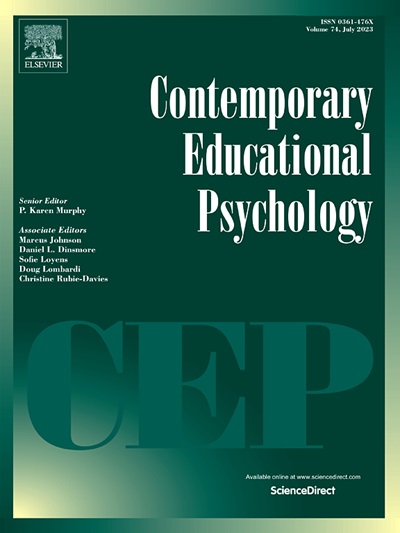Exploration of mindset meaning system in an elite competitive schooling context using a mixed-methods approach
IF 3.8
1区 心理学
Q1 PSYCHOLOGY, EDUCATIONAL
引用次数: 0
Abstract
Recent controversy surrounding the heterogeneous effects of growth mindset suggests the need to examine mindset meaning systems in diverse educational contexts. Employing a mixed-methods explanatory sequential design, we investigated the mindset meaning system in a competitive elite Korean high school. Quantitative results (n = 343) partially replicated Blackwell et al. (2007)’s findings, generally supporting the mindset meaning system (Dweck & Yeager, 2019): growth mindsets were connected to mastery goals and positive effort beliefs, which were linked to effort-based strategies and lower helpless attributions, respectively. Neither growth mindset nor its motivational outcomes, however, were associated with academic achievement. Qualitative findings from purposefully selected interviewees with different mindset trajectories (n = 14) suggested individual and contextual factors potentially relevant in explaining the lack of association between mindset meaning systems and academic achievement. Student perceptions of mindsets were complicated and nuanced, with one salient aspect being domain-specificity. Regardless of their mindsets and attributions, students devoted increased effort and used strategies they deemed effective to overcome academic difficulties. Effort and strategies were also heavily emphasized in home and school contexts. Integrated findings suggest that while a growth mindset may not directly impact academic achievement in competitive settings, it can still foster adaptive motivation. In addition to promoting a growth mindset, encouraging students to recognize that effort and strategies may not always yield immediate academic success, and normalizing experiences of failure, can support their motivation in competitive learning environments. Further research should examine the mindset meaning system across diverse contexts to extend its applicability.
运用混合方法探讨精英竞争学校背景下的心态意义系统
最近关于成长心态的异质效应的争论表明,有必要在不同的教育背景下研究心态的意义系统。采用混合方法解释序列设计,我们调查了一所竞争激烈的韩国精英高中的心态意义系统。定量结果(n = 343)部分重复了Blackwell等人(2007)的发现,总体上支持心态意义系统(Dweck &; Yeager, 2019):成长心态与掌握目标和积极努力信念有关,而这两个信念分别与基于努力的策略和较低的无助归因有关。然而,成长心态及其激励结果与学业成绩都无关。有目的地选择具有不同心态轨迹的受访者(n = 14)的定性研究结果表明,个人和环境因素可能与解释心态意义系统与学业成就之间缺乏联系有关。学生对心态的感知是复杂而微妙的,其中一个突出的方面是领域特异性。无论他们的心态和归因如何,学生们都投入了更多的努力,并使用了他们认为有效的策略来克服学业困难。在家庭和学校环境中,努力和策略也被高度强调。综合研究结果表明,虽然成长型心态可能不会直接影响竞争环境中的学业成绩,但它仍然可以培养适应性动机。除了促进成长的心态,鼓励学生认识到努力和策略不一定会立即取得学业上的成功,并使失败的经历正常化,可以在竞争激烈的学习环境中支持他们的动力。进一步的研究应在不同的语境中考察思维意义系统,以扩大其适用性。
本文章由计算机程序翻译,如有差异,请以英文原文为准。
求助全文
约1分钟内获得全文
求助全文
来源期刊

Contemporary Educational Psychology
PSYCHOLOGY, EDUCATIONAL-
CiteScore
16.50
自引率
3.90%
发文量
74
期刊介绍:
Contemporary Educational Psychology is a scholarly journal that publishes empirical research from various parts of the world. The research aims to substantially advance, extend, or re-envision the ongoing discourse in educational psychology research and practice. To be considered for publication, manuscripts must be well-grounded in a comprehensive theoretical and empirical framework. This framework should raise critical and timely questions that educational psychology currently faces. Additionally, the questions asked should be closely related to the chosen methodological approach, and the authors should provide actionable implications for education research and practice. The journal seeks to publish manuscripts that offer cutting-edge theoretical and methodological perspectives on critical and timely education questions.
The journal is abstracted and indexed in various databases, including Contents Pages in Education, Australian Educational Index, Current Contents, EBSCOhost, Education Index, ERA, PsycINFO, Sociology of Education Abstracts, PubMed/Medline, BIOSIS Previews, and others.
 求助内容:
求助内容: 应助结果提醒方式:
应助结果提醒方式:


